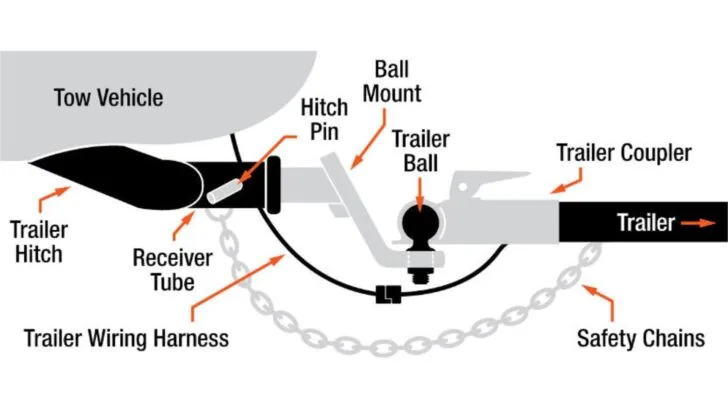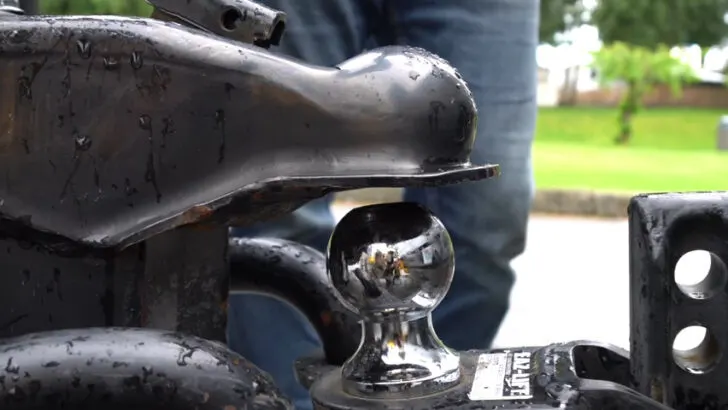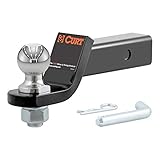Safe towing is an important but multi-faceted process. Before you can safely tow a car, boat, travel trailer, or utility trailer, you need a few pieces of information. Today we’re looking specifically at ball hitch sizes.
You might think there’s a single common hitch ball size and that’s that. But in fact, that’s not the case. Coupler sizes and hitch ball sizes vary, and weight ratings are a very important consideration as well. So, where ball hitches are concerned, there’s a bit more than meets the eye.
In this post, we’ll give you the details you need to safely tow your camper, boat, tow vehicle, or utility trailer.
Let’s get right to it!
What Is a Hitch Ball?
A hitch ball, sometimes called a “trailer ball” or “tow ball”, is the part of a towing system that connects a trailer or tow vehicle to a hitch. A hitch ball gets its name from the fact that it’s shaped like a ball and is part of the tow hitch/trailer hitch. So, the ball-shaped attachment that goes into the trailer ball hole is the hitch ball.
Following is a diagram of a hitch system (courtesy of Curt Manufacturing) to help us to identify the various parts of a standard tow system.
Note the receiver tube on the tow vehicle. The ball mount slides into the receiver and attaches to the receiver tube with a hitch pin. On the other end of the ball mount is the hitch ball/trailer ball. The trailer’s coupler must fit properly over the hitch ball/trailer ball.

This diagram shows the various parts of a towing system. (Source: Curt Manufacturing)
Are All Hitch Balls the Same?
No. Hitch balls are not all the same. Though American hitch balls are fairly standard, there are some important differences.
There are variations in hitch ball sizes, hitch ball weight ratings, and shank diameters. All of these factors are important to know.
Note that hitch ball weight ratings and receiver hitch ratings are of equal importance to safe towing, as is the correct trailer ball size.
What Are the Different Hitch Ball Sizes?
Trailer hitch balls are typically sized as follows:
- 1 7/8″ (light-duty trailers)
- 2″ (medium trailers)
- 2 5/16″ (heavy trailers)
- 3″ (gooseneck trailers)
What Is the Most Common Hitch Ball Size?
The most commonly used hitch ball size is a 2-inch diameter ball. You’ll find these regularly used on campers, utility trailers, and boat trailers.
A 2-inch hitch ball or trailer ball can have a weight capacity of anywhere from 3,500 pounds to 12,000 pounds, so they’re found on a wide variety of campers and trailers.
How Do I Know What Size Ball My Trailer Needs?
The correct size of the trailer ball you need is determined by three factors:
- Coupler size
- Diameter of the trailer ball hole
- Your towing capacity
To determine the correct hitch ball size you’ll need, take the following steps:
Match the Sizes of the Ball and Coupler
Your trailer must have a ball that matches the size of the trailer coupler exactly.

A trailer’s coupler must fit properly over the hitch ball for safe towing.
To determine the size of the ball itself, measure the diameter of the hitch ball.
In order to find the correct hitch ball size for your trailer, locate the trailer coupler size. It should be stamped right on the coupler.
If you can’t find the stamped coupler size (or if it’s difficult to read) you’ll need to use a tape measure or ruler to measure the inside opening of the coupler. (Measure the distance from one side of the opening to the other.) This measurement is the hitch ball size you’ll need.
Match the Shank to the Trailer Ball Hole
The hitch ball/trailer ball bolts onto a ball mount through a hole in the ball mount.
You need to know the diameter of this hole in order to choose a ball with a matching shank diameter. This is very important because if your ball’s shank is smaller than the trailer ball hole, it will likely come loose as it shifts around while you’re towing.
Match the Weight Capacity of Your Towing System
Your hitch ball/trailer ball will have a weight capacity, typically listed as the “ball capacity”. This capacity refers to the gross trailer weight limit and NOT the tongue weight. (For more information on tongue weight, see our post entitled, “What Is Tongue Weight?“)
Your hitch ball/trailer ball must have a ball capacity GREATER THAN the gross weight of your trailer.
For those who prefer a more visual learning experience, here’s a good video tutorial on hitch ball sizes:
What Are the Best Quality Ball Hitches?
Buying a good quality ball hitch is as important to safe towing as getting a properly-sized ball hitch. Curt and Reese are both highly respected in the industry, with longstanding reputations for high-quality products.
Following are a couple of standard 2″ examples from each manufacturer.
You’ll need to consider measurements (including the rise or drop between your trailer and tow vehicle) and weight capacities when purchasing any ball hitch for your towing system.
- DEPENDABLE STRENGTH - Rated to tow 7,500 pounds gross trailer weight and 750 pounds tongue weight, this ball hitch offers dependability for your...
- VERSATILE USE - This trailer hitch ball mount comes with a 2-inch x 2-inch shank to fit virtually any industry-standard 2-inch receiver. The ball...
- Fits 2" square receiver tube opening
- 6000 pound capacity
If you need to tow trailers that require different ball sizes, (for example, if you have a travel trailer, a boat trailer, and a utility trailer), this multi-ball hitch from Curt Manufacturing may apply to your situation:
- HIGHLY VERSATILE. This trailer hitch ball mount features 3 welded trailer balls on a single shank to accommodate a wide variety trailers. It's perfect...
- DEPENDABLE STRENGTH. The 1-7/8-inch ball is rated for 5,000 lbs. GTW / 500 lbs. TW, the 2-inch for 10,000 lbs. GTW / 1,000 lbs. TW, and the...
Free RVing Tips, Tricks, Reviews, Giveaways & More
Subscribe to our daily newsletter! We’ve been full-time RVers for 20 years (!) and share everything we’ve learned about RVing in our daily blog posts. Join our online community to receive a wealth of great RVing knowledge delivered right to your inbox.
Whether this is your first time on the road or you’re a seasoned full-timer, you’ll love the wide range of RVing topics we cover. Don’t miss a single article or any of our famous RV gear Giveaways — Subscribe today!




